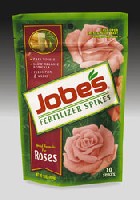





Good news for gardeners...... roses is are not hard to grow. Anyone can grow these beautiful bushes. With a little loving care and attention, you will be amply rewarded. Supplement this attention with additional learning about caring for rose, and you have a winning combination! Roses respond extremely well to the care you provide. And, roses like regular applications of fertilizer.
Here is the key ingredients to growing a healthy, productive rose plant, whether grown singularly or in a rose garden.
1. Plenty of Sunshine: This is the first and foremost ingredient . When planning your garden, keep in mind that roses like full sun. If that is not available, roses will tolerate partial shade. My rose garden is in partial shade, and they grow quite well.
2. Rich, loose soil: Roses require a lot of food and nutrients. When planting roses, make sure to mix in generous portions of compost and manure into the native garden soil. If this is not available, add store bought peat moss and cow manure.
3. Provide plenty of nutrients: Roses consume significant amounts of nutrients. What you add to your soil will get them off to a great start, but they will favorably respond to additional fertilizer added year after year. You've likely heard tales of fellow gardeners burying the remains of fish, or other animals, under their rose bush with stellar results. These stories are largely true. We do caution you that while your roses will respond favorably, a fish under your plant can cause the neighborhood cat to create a very unfavorable side effect, and likely damage to the root system.
Did you know? The middle number in common fertilizer is Phosphorus. This is the chemical element in the plant world that promotes flower blooming. When growing flowers, a fertilizer heavy in phosphorus will help promote those big, beautiful blooms that growers seek. Most garden stores will have several varieties of fertilizers and ones specifically for roses. When you read the ingredients, you will see the higher phosphorus levels.
Fertilize on a regular basis. We recommend every two to three weeks. Follow the directions on the fertilizer box or bag. Use a higher nitrogen fertilizer at the beginning of the season to promote growth of leaves and roots. Switch over to higher phosphorus as the first buds begin to appear.
4. Pour on the Water: Roses like lots of water. This does not mean they like to get their feet wet. As mentioned above, they like loose soil, which drains well. The right amount of moisture held in the soil compliments of the compost you provide. Adjust your watering to add more for sandy soils, and less for clay soil.
We also recommend you water at the base of the plant and avoid getting the leaves wet. Hot humid weather is a breeding ground for rose diseases. Adding water to the leaves during humid weather will help promote disease. In addition, if you have applied insecticide or fungicides, you are washing it away.
Tip: Place a drip or soaker hose around your rose garden and cover with mulch.
5. Mulch for Weed Control: Do not let weeds ruin the beauty of your rose garden. In addition to "stealing the show", weeds will rob your rose bush of water and nutrients. Avoid this by applying a heavy layer of mulch. Organic mulches are preferred as they will convert over time to compost, further enriching your soil. You can add several inches, effectively blocking but all but the most persistent of weeds. Or, you can lay down black plastic, then add a lighter lay of mulch.
6. Prune and trim: A rose bush will also respond favorably to a good manicure. Prune your bush on a regular basis. A well maintained bush has a full, yet not shaggy appearance. Allow several main stems to grow and develop. Allow enough room between the stems for good air circulation. This will help to avoid plant diseases. It will also cause the plant to focus it's energies on the remaining stems, rewarding you with bigger rose blooms.
7. Guard against insects and disease: Roses are susceptible to both insects and disease. Make sure you know the signs and the treatment.

Grow the perfect roses with Jobe's Rose Fertilizer spikes. Spikes continuously release essential nutrients to your plant's roots for up to 8 weeks.
Buy Fertilizer Spikes now
Copyright © www.100flowers.win Botanic Garden All Rights Reserved